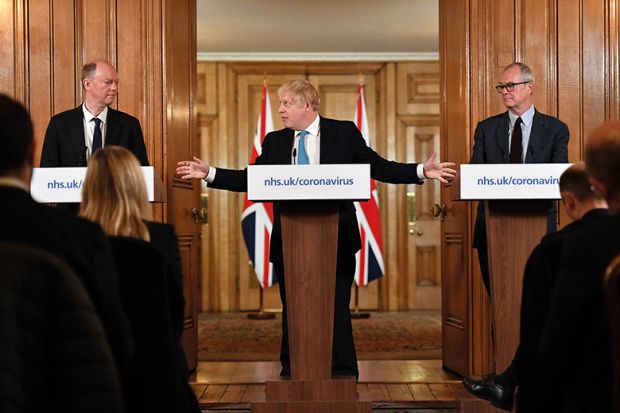A major spotlight has been thrown on the way scientific advice is being given to and used by the UK government after it dramatically changed tack in the battle against the coronavirus outbreak.
The UK’s approach suddenly moved up a gear on 16 March and was followed by five days of ramping up interventions including school closures, the shutting of pubs and restaurants and social distancing advice.
Accompanying the shift was the publication of a paper from a team of epidemiologists at Imperial College London, one of the main groups advising the government on Covid-19, that concluded that such interventions were the “only viable strategy” to prevent the health service being overwhelmed.
It followed several days in which the previous government position was being increasingly questioned by some in the scientific community, with calls for more transparency on the advice being given.
The group at Imperial, led by Neil Ferguson, director of the Abdul Latif Jameel Institute for Disease and Emergency Analytics – who himself tested positive for Covid-19 last week – conducts modelling on the epidemic that then feeds into the Scientific Advisory Group for Emergencies (Sage), which advises ministers on various courses of action.
James Wilsdon, professor of research policy at the University of Sheffield, who is also vice-chair of the International Network for Government Science Advice, said the Sage system, where other subcommittees feed in specialised evidence depending on the crisis, was admired around the world.
But it was inevitable, he continued, that at some point there would be a review of the current crisis and how scientific advice had mixed with the politics of the situation.
“In general, Sage, and the UK approach for managing emergencies, is seen as one of the best systems in the world and something that other countries in general have followed and, in a number of cases, sought to emulate,” he said.
“I think it is premature to point the finger at the science advisory system as [being a] problem because…by and large, they are doing as good a job as can be expected in difficult circumstances,” he added.
Professor Wilsdon said the “bigger questions” were political, given that academics advising Sage or its subcommittees were simply presenting the science to ministers to make a decision.
“It is problematic if political choices are being made and then the science advice system has to front them up. There needs to be a clearer sense of where science advice ends and political judgement begins − and at times that has been quite blurred,” Professor Wilsdon said.
Another question that has been raised by the current crisis is whether a diversity of scientific voices were being heard by Sage and if the research that is informing policy is being shared extensively enough with the wider community before being considered by the government.
According to Mike Galsworthy, head of the campaign group Scientists for EU and a health services researcher, “if you shut down the ability of the rest of the science community to scrutinise an input, then you’re not actually following ‘the science’”.
Dr Galsworthy also wondered whether a fixation on scientific excellence in the UK may have blinded the Sage system and the government to the importance of other evidence from around the world on the outbreak until very recently.
“What we’re seeing [from the crisis] is that there are brilliant scientists all over the world, in the public sector and in the private sector,” he said.
John Edmunds, professor of infectious disease modelling at the London School of Hygiene and Tropical Medicine, whose team, like that at Imperial, feeds epidemic modelling into Sage, insisted that he and his colleagues had tried to review all the global evidence on Covid-19, a task that was especially difficult given the “phenomenal” amount of data available.
“That is part of what those committees are there to do. Look at that evidence, filter it, bring it up to Sage,” he said. “Just keeping on top of it is not easy, but it is better having that problem than having no data at all. I prefer it this way round.”
He also said there was “a range of different evidence, not just one voice”, that feeds up to Sage through subcommittees such as SPI-M-O, which assesses epidemic modelling.
Professor Edmunds added that in terms of British expertise, there was “no question” that in his field there was “more expertise in this country in this particular field than anywhere else in the world”.
“And not only do we have the academic expertise, we also have the expertise in our public health institutions, and we have these decision-making bodies that have been put in place that are au fait with this evidence,” he said. “We’ve practised this over many, many years.”
后记
Print headline: Crisis shines spotlight on UK science advice system




